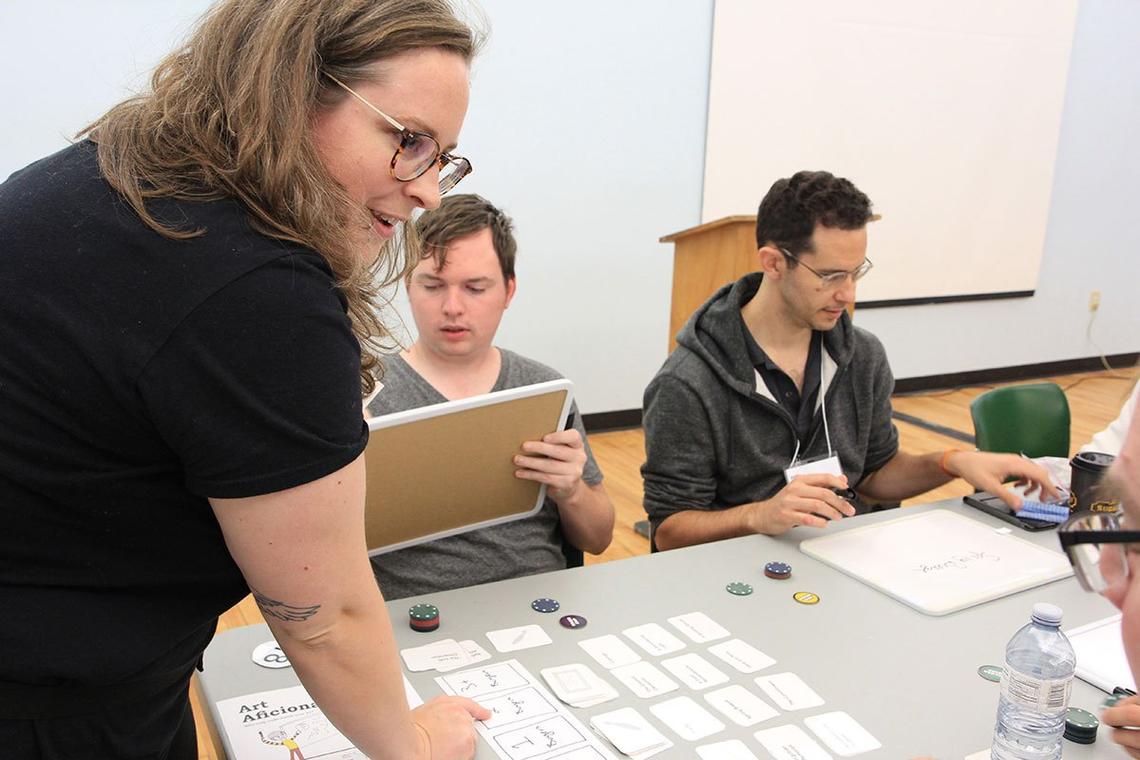
Walls says playtesting is an essential step towards refining a board game
Oct. 29, 2019

Dice, pawns, cards, timers, and tokens. Are you thinking board games yet? Board games can bring people together to laugh and play and these attributes continue to drive Pam Walls to do the work that she loves. Pam Walls BA’07, designs board games—party games to be precise. “Growing up my family loved to play board games and while we liked the popular games, like Pictionary and Balderdash, we tended to throw our own twists into the rules.”
It was during her time on campus studying International Relations that Walls began exploring the idea of designing board games herself. “I remember that I emailed a board game designer and asked how to go about designing games,” Walls describes “and while they never got back to me, I was still motivated to start designing my own games.” It was around this time that Walls, with the help of her sister Meg, first attempted to create a board game in her Kananaskis Hall dorm room.
As Walls describes, it doesn’t take a lot of materials or money to create a board game but it is important to test your concept both with people you know and those you don’t. Walls says, “it’s only when you get people to play it that you really discover what works well, what’s fun and engaging, as well as what doesn’t work in the game. This is called playtesting and is a crucial part of the design process.”
After university, Walls moved to Toronto where she continued to develop her games and her network. Toronto has a vibrant tabletop design community but was missing a weekend-long playtesting convention. While there are a number of these events in the states, the travel, accommodation and badge can be quite expensive. So in 2016 Walls founded ProtoTO to provide the local board game community the opportunity to come together to playtest their games. Designers bring their card, board and role-playing prototypes to this annual event where playtesters provide important feedback.

Walls says playtesting is an essential step towards refining a board game
Not only has Walls made her mark on the local design community by providing a venue for people to gather and improve their craft, but she is also having an impact on the industry on a larger scale. “When I started in the industry, I realized that most of the designers are cis men, and I couldn’t find an active forum for women and gender non-conforming folks who design games." So Walls established Board Game Broads, an online forum where members share their ideas and experiences and also have the opportunity to participate in a mentorship program for those who are looking for guidance along their journey in the tabletop industry. Walls says that having more diverse voices and perspectives in the tabletop design community is already having a positive impact. “In recent years I’ve noticed I am seeing less games with scantily dressed female characters and more awareness in regards to depictions of minority groups,” says Walls.
Another trend Walls has seen grow over the years is authorship on the box. Like literary authors, Walls describes board games as a craft and says, “designers should be credited for their work in creating these products and having our names on the box gives us more visibility.” For example, Walls was thrilled when Hasbro, who licensed her party game about facial expressions called Hold That Face in 2016, agreed to feature her name on the front of the box. While this is not the case for all games, it is certainly a step in the right direction.
When asked her next move, Walls says that she is currently in contract negotiations for her next party game and is working on several more game concepts including co-designing a strategy game, a first for her. ProtoTO recently wrapped up its fourth event and Walls is proud to see the conference, and community, grow each year. She will soon start preparations for ProtoTO 2020, which will take place next fall. For anybody interested in trying their hand at board game design, Walls’ advice is “don't spend too much money or time on making your prototype look pretty. Focus on making sure it plays well.”
Your turn!